PRAISE FOR ALLAN G. JOHNSONS
The Forest and the Trees
My most frequent margin notes in this book were great and cool, and I wrote them often. Not only does Johnson present the sociological perspective in a smoothly written, easily digestible form[;] he also makes surprising turns and gently leads the reader into some interesting implications of otherwise familiar arguments.... His examples shine.... Johnsons impressive ability [is] to take the familiar and give it a twist, or to find intellectual surprises in the midst of conventional wisdom.... Repeatedly, Johnson explains tricky ideas simply.... He respects his readers, talking in terms they will understand while always pushing them intellectually to take one more step. Daniel F. Chambliss, Contemporary Sociology
Johnsons prolegomenon to the study of sociology, written for... sociology students at all levels, presents a core view of sociology: individuals always participate in something larger than themselvessocial systems; social life flows from this relationship between smaller and larger, between the forest and the trees.... Johnsons discussion is masterful.Choice
If you are passionate in your belief in the promise of sociology to challenge how people think about social life and how they participate in it, you will find The Forest and the Trees an inspiring resource for your students.... I highly recommend this book as a very useful teaching aid for introductory sociology in the Berger and Mills traditions.
B. Gerry Coulter, Canadian Review of Sociology and Anthropology
The Forest and the Trees
ALSO BY ALLAN G. JOHNSON
NONFICTION
The Gender Knot
Privilege, Power, and Difference
The Blackwell Dictionary of Sociology
FICTION
The First Thing and the Last
Nothing Left to Lose
ALLAN G. JOHNSON
The Forest and the Trees
Sociology as Life, Practice, and Promise
THIRD EDITION

TEMPLE UNIVERSITY PRESS
PHILADELPHIA
TEMPLE UNIVERSITY PRESS
Philadelphia, Pennsylvania 19122
www.temple.edu/tempress
Copyright 2014 by Allan G. Johnson
All rights reserved
Published 2014
Library of Congress Cataloging-in-Publication Data
Johnson, Allan G.
The forest and the trees : sociology as life, practice, and promise / Allan G. Johnson.
Third edition.
pages cm
Includes bibliographical references and index.
ISBN 978-1-4399-1186-0 (hardback : alk. paper) ISBN 978-1-4399-1187-7
(paper : alk. paper) ISBN 978-1-4399-1188-4 (e-book) 1. Sociology. I. Title.
HM585.J64 2014
301dc23
2014006587
 The paper used in this publication meets the requirements of the American National Standard for Information SciencesPermanence of Paper for Printed Library Materials, ANSI Z39.48-1992
The paper used in this publication meets the requirements of the American National Standard for Information SciencesPermanence of Paper for Printed Library Materials, ANSI Z39.48-1992
9 8 7 6 5 4 3 2 1
For Alice
Contents
Acknowledgments
F or their thoughtful feedback and suggestions in the preparation of the third edition, I am grateful to Terence McGinn (University of Michigan), Elisabeth M. Lucal (Indiana University South Bend), Michael Schwalbe (North Carolina State University), and anonymous reviewers for Temple University Press. I am especially grateful to my editor, Janet Francendese, for her enthusiastic support for my work, and those whose hard work brought the book into printproduction editor Joan Vidal, design director Kate Nichols, and copy editor Heather Wilcox.
Introduction
Life, Practice, and Promise
I am a practicing sociologist, and this book is about what it is that I practice, what it means, and why it matters. This book is about how the practice finds its way into almost every aspect of life, from headlines in the news to the experience of growing older to the ravages of war, injustice, oppression, and terrorism in the world. It is about things small and large, things simple and things far more complex than what we can imagine.
I practice sociology in many ways. I practice it when I think about how social life works, when I write books, and when I work with people trying to see what is going on in the world and our lives in it. I practice as a public speaker and workshop facilitator to help solve the dilemmas of a diverse and difficult world in which race, gender, sexual orientation, disability status, and other forms of privilege, power, and oppression cast dark shadows over peoples lives. I practice when I read the news or turn on the television or go to the movies. I practice when I walk down a street, shop in a market, or sit in a sidewalk restaurant and watch the world go by and wonder what life really is all about, what this stream of interconnected peoples lives consists of, what knits it all together and what tears it apart, and what it has to do with me.
I practice sociology for many reasons. I practice because there is so much unnecessary suffering in the world and because to do something about that suffering, we need to understand where it comes from. In this sense, practicing sociology has a profoundly moral dimension. I mean moral not in the sense of being good instead of bad but in a deeper and broader sociological sense that touches on the essence of what we are about as human beings and what our life together consists of. It is impossible to study social life for very long without coming up against the consequences that social life produces, and many of these consequences do such damage not only to peoples lives but to other species and the Earth itself, that, unless we find ways to deny or ignore reality, we feel compelled to ask, Why? And once we ask that question, we need tools to help make sense of where it leads and to imagine how we might go from there toward something better.
We cannot help but be part of the problem, but practicing sociology is a way to also be part of the solution. This not only helps the world but also makes it easier to live in, especially given how crazy a place it can be. It helps to be able to see how one thing is connected to another and, in that, how to find ways to make a difference, however small. We cannot change the world all by ourselves, but we can make informed decisions about how to participate in it and thereby help turn the world toward something better, even if it is in our neighborhoods or families or where we work or go to school.
I would not practice sociology if I didnt believe something better was possible. I believe that the choices we make as individuals matter beyond our lives more than we can imagine, that things dont have to be the way they are but that they will not get better all by themselves. We need to do something, and what we do needs to be based on more than hunches and personal opinion and prejudice. We need systematic ways to figure things out, and that is what sociological practice provides.
I also practice sociology because it helps me keep in touch with the essence of my own life in the world, for sociology isnt simply about some larger world out there. It is also about each of us in the world and the connection between the two, which means it can take us toward basic truths about who we are and what our lives are about. I practice sociology as a way to remind myself that for all that we think we know about things, beneath that knowledge is all that we do not know, which is good reason to feel some awe.
There are times, for example, when I am amazed that social life works at all, that we are able to live and work together as much as we do, to talk, dream, imagine, fight, and create. There is something miraculous about the simplest conversation, in the sense that we can never get to a core truth about how it happens. We can contemplate the miracle of things by taking ourselves toward the limit of what we can know. And we can feel the fringe of core truths and how our lives are part of them. So, while my sociological practice is usually about understanding the world, it is also about keeping myself in touch with the unknowable essence of human existence that lies beneath.
Next page

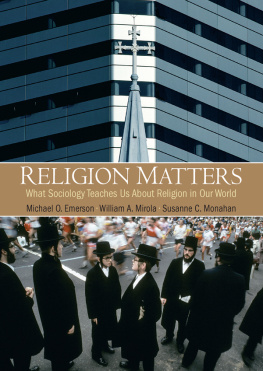

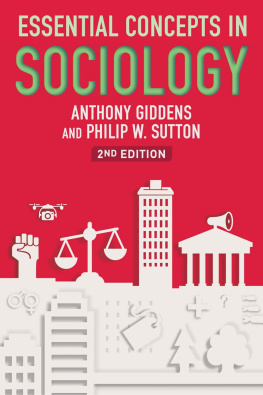
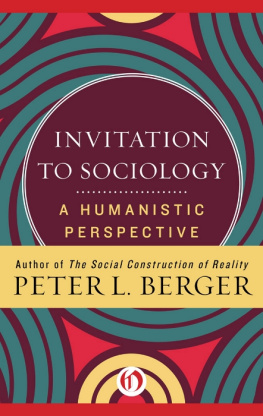
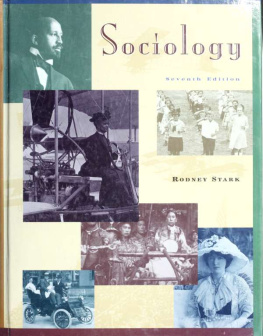

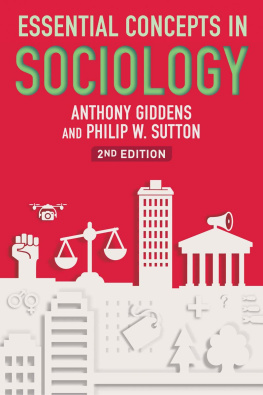

 The paper used in this publication meets the requirements of the American National Standard for Information SciencesPermanence of Paper for Printed Library Materials, ANSI Z39.48-1992
The paper used in this publication meets the requirements of the American National Standard for Information SciencesPermanence of Paper for Printed Library Materials, ANSI Z39.48-1992